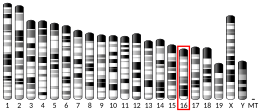MKL/myocardin-like protein 2 is a protein that in humans is encoded by the MKL2 gene.[5][6]
Members of the myocardin family bind to the transcription factor serum response factor (SRF) and act as coactivators controlling genes of relevance for myogenic differentiation, motile function [7] and addiction. [8]
References
edit- ^ a b c GRCh38: Ensembl release 89: ENSG00000186260 – Ensembl, May 2017
- ^ a b c GRCm38: Ensembl release 89: ENSMUSG00000009569 – Ensembl, May 2017
- ^ "Human PubMed Reference:". National Center for Biotechnology Information, U.S. National Library of Medicine.
- ^ "Mouse PubMed Reference:". National Center for Biotechnology Information, U.S. National Library of Medicine.
- ^ Nagase T, Ishikawa K, Kikuno R, Hirosawa M, Nomura N, Ohara O (Jan 2000). "Prediction of the coding sequences of unidentified human genes. XV. The complete sequences of 100 new cDNA clones from brain which code for large proteins in vitro". DNA Res. 6 (5): 337–45. doi:10.1093/dnares/6.5.337. PMID 10574462.
- ^ "Entrez Gene: MKL2 MKL/myocardin-like 2".
- ^ Nagase T, Ishikawa K, Kikuno R, Hirosawa M, Nomura N, Ohara O (September 2016). "Emerging roles of the myocardin family of proteins in lipid and glucose metabolism". J Physiol. 594 (17): 4741–4752. doi:10.1113/JP271913. PMC 5009794. PMID 27060572.
- ^ Ariza A, Funahashi Y, Kozawa S, Faruk MO, Nagai T, Amano M, Kaibuchi K (2021). "Dynamic subcellular localization and transcription activity of the SRF cofactor MKL2 in the striatum are regulated by MAPK". Journal of Neurochemistry. 157 (6): 1774–1788. doi:10.1111/jnc.15303. PMID 33449379. S2CID 231613803.
Further reading
edit- Nakajima D, Okazaki N, Yamakawa H, et al. (2003). "Construction of expression-ready cDNA clones for KIAA genes: manual curation of 330 KIAA cDNA clones". DNA Res. 9 (3): 99–106. doi:10.1093/dnares/9.3.99. PMID 12168954.
- Wang DZ, Li S, Hockemeyer D, et al. (2003). "Potentiation of serum response factor activity by a family of myocardin-related transcription factors". Proc. Natl. Acad. Sci. U.S.A. 99 (23): 14855–60. Bibcode:2002PNAS...9914855W. doi:10.1073/pnas.222561499. PMC 137508. PMID 12397177.
- Strausberg RL, Feingold EA, Grouse LH, et al. (2003). "Generation and initial analysis of more than 15,000 full-length human and mouse cDNA sequences". Proc. Natl. Acad. Sci. U.S.A. 99 (26): 16899–903. Bibcode:2002PNAS...9916899M. doi:10.1073/pnas.242603899. PMC 139241. PMID 12477932.
- Cen B, Selvaraj A, Burgess RC, et al. (2003). "Megakaryoblastic leukemia 1, a potent transcriptional coactivator for serum response factor (SRF), is required for serum induction of SRF target genes". Mol. Cell. Biol. 23 (18): 6597–608. doi:10.1128/MCB.23.18.6597-6608.2003. PMC 193697. PMID 12944485.
- Selvaraj A, Prywes R (2004). "Megakaryoblastic leukemia-1/2, a transcriptional co-activator of serum response factor, is required for skeletal myogenic differentiation". J. Biol. Chem. 278 (43): 41977–87. doi:10.1074/jbc.M305679200. PMID 14565952.
- Ota T, Suzuki Y, Nishikawa T, et al. (2004). "Complete sequencing and characterization of 21,243 full-length human cDNAs". Nat. Genet. 36 (1): 40–5. doi:10.1038/ng1285. PMID 14702039.
- Gerhard DS, Wagner L, Feingold EA, et al. (2004). "The status, quality, and expansion of the NIH full-length cDNA project: the Mammalian Gene Collection (MGC)". Genome Res. 14 (10B): 2121–7. doi:10.1101/gr.2596504. PMC 528928. PMID 15489334.
- Olsen JV, Blagoev B, Gnad F, et al. (2006). "Global, in vivo, and site-specific phosphorylation dynamics in signaling networks". Cell. 127 (3): 635–48. doi:10.1016/j.cell.2006.09.026. PMID 17081983. S2CID 7827573.
- Morita T, Mayanagi T, Sobue K (2007). "Dual roles of myocardin-related transcription factors in epithelial mesenchymal transition via slug induction and actin remodeling". J. Cell Biol. 179 (5): 1027–42. doi:10.1083/jcb.200708174. PMC 2099179. PMID 18056415.




